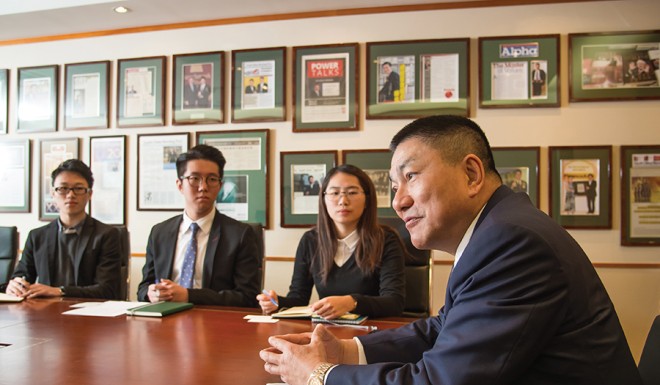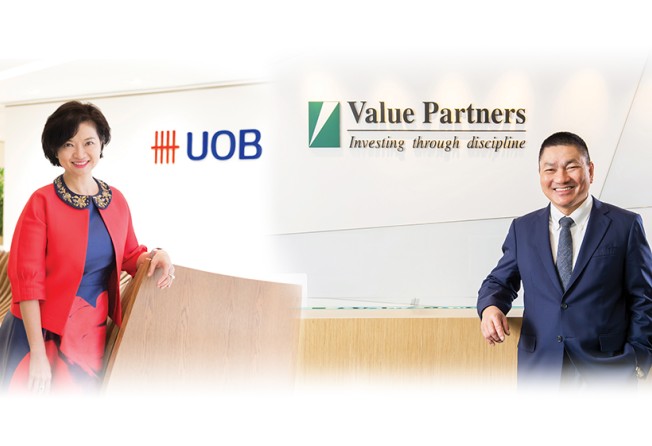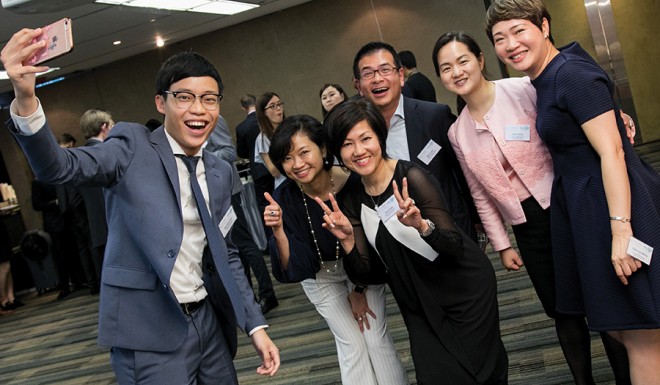
Inside Track

[Sponsored Article]
An internship can provide the all-important building blocks for developing a future career. The process can include learning through practical experience, gaining insights into industry trends, and forming the first threads of a professional network. Chairman of Value Partners Group, Dato’ Cheah Cheng Hye, and CEO - Greater China of the United Overseas Bank (UOB), Mrs Christine Ip, explain how internships can provide a valuable learning curve for students and make a big difference when they enter the job market.
Adding value

The Value Partners Young Fellowship Program, available exclusively to students of the HKUST Business School, is designed to provide internships that improve knowledge of the finance industry, develop soft skills, and strengthen career prospects. The program is offered by Value Partners, one of the largest independent asset management firms in Asia.
Co-Founder and Chairman of Value Partners Cheah Cheng Hye, who is also a member of the HKUST Business School Council, says the program acts as a bridge between university life and the daily work of an asset management company. It’s similar to the way the asset management industry acts as the bridge between savings and investment, he notes. Interns receive guidance and mentoring, and gain hands-on experience from working on real deals and projects, and the six-month, full-time internship programme includes a salary. “As with many things in life, skills are developed from real-world experience,” says Cheah, noting that value investing is more than an investment strategy — it’s a fundamental way of thinking about finance.
Cheah says interns gain valuable experience from working alongside professionals in an environment defined by teamwork, the use of cutting-edge technology, and high-quality, well-constructed and well-executed business processes. Value Partners is one of a small number of Hong Kong-based asset management companies to offer a fully integrated business model. So interns are able to gain insight into all the functions of a value investing platform.
Cheah believes the development of soft skills is one of the most significant advantages of the internship. Students learn hard skills such as financial analysis and accounting at university, but Cheah stresses that soft skills can also make a big difference. “It’s about leadership, situational awareness, how you articulate your ideas, and how to make good decisions. It’s about being a thinker and a hard worker,” says Cheah. A high emotional intelligence quotient (EQ), a rating which aims to measure how a person relates to others, is equally important, he says. “These may seem like old-school values, but they remain as relevant today as they have always been,” says Cheah.
Cheah emphasises that anyone considering joining the asset management industry should do so for the right reasons. He says that individuals who join the industry believing they will receive a high salary and big bonuses for themselves will struggle to find success. Those who aspire to build a career in the asset management sector should always put their clients’ best interests at the forefront of their decisions, and take personal ownership of the projects they work on, he explains. “It’s like a successful marriage, as there has to be passion for it to work well,” he says.
While Value Partners doesn’t expect interns to be fully conversant with the asset management industry, they are expected to demonstrate “differentiated, value-added” potential. This means that if an employee is absent from the workplace for any reason, their contribution to their team, and the organization as a whole, should immediately be missed. With fund management transactions upwards of US$200 million taking place every week, Cheah stresses employees, including interns, should also have respect for compliance and business ethics. On the first day in the office, each new Value Partners staff member, including interns, must sign a “My Promise” pledge which is framed and placed on his or her desk. “The pledge reminds everyone to work at the highest level of honesty, while always striving for self-improvement,” says Cheah.
Kimberley Wu, a finance and economics student, says her internship at Value Partners has broadened her horizons. Wu participated in bond issuance roadshows, and learned about the way different markets work. As a result, she may decide to pursue a job working with credit instead of in the equities market, which was her original choice. Wu also notes that the economics, finance, and accounting courses she studied at HKUST have provided her with a solid foundation and helped her during the internship. “Because I am familiar with the terminologies and principles my colleagues use, I am able to learn faster. I don't feel isolated,” says Wu.
Fellow intern Brian Lai, a finance and operations management student, shares Wu’s view. Lai says the knowledge gained from his studies at HKUST ensured he would reap the benefit of his internship. A good example, he says, has been the chance to apply valuation and investment strategy theories to real situations. Lai also values the opportunity to develop his soft skills at Value Partners. “I used to think of asset management as being about large funds and global transactions, but after joining various conversations with fund managers and clients, I understand how asset management is actually a very down-to-earth business,” notes Lai.
Another GBUS student Eamon Suen says working on quantitative investment solutions as part of his internship enabled him to learn how things are done today, rather than how they were done yesterday. Suen says his soft skills have improved because he learned to look beyond the numbers and data to assess the implications investment decisions can have for clients.
Suen and his fellow Value Partners interns advise potential program applicants to research the company first. Suen adds that prospective interns should think carefully about why they want to join the asset management industry, and which asset class they would like to work in.
A closer look at commercial banking and the corporate world

Internship programs have always provided university students with opportunities to discover what it’s like to work in a particular discipline or for a particular company. But the United Overseas Bank (UOB) and the HKUST Business School are offering students a unique opportunity.
As a leading wholesale bank in Hong Kong, UOB provides full-fledged banking services to its corporate clients from different segments including commercial banking. The UOB Commercial Banking Academy was set up to nurture the future business leaders though the partnership with top-notch universities such as HKUST. The UOB-HKUST Practicum in Commercial World, which is a program of UOB Commercial Banking Academy, allows interns to gain workplace experience in the wholesale banking environment as well as the corporates that bank with UOB.
The UOB-HKUST Practicum in Commercial World, which offers ten weeks of immersive, hands-on experience, has been designed to provide interns with insights into how a wholesale bank operates. It also allows them to see how the bank does business with its client companies. During the first two weeks, interns are introduced to UOB’s wholesale banking business, different client segments especially commercial banking, risk, compliance and treasury.
They are also assigned a mentor, who is usually a department head, or team leader at UOB’s commercial banking team. The mentor shares his or her knowledge and experiences with the interns, and helps them develop their strengths. “We want students to experience exactly how it feels to work in a wholesale bank, and to imagine how it could feel to be in their mentor’s position in five to ten years’ time,” explains Christine Ip, CEO, UOB Greater China.
Following a two-week big-picture introduction to the world of wholesale banking with a focus on commercial banking segment, Academy interns join a UOB client company, where they learn about commercial banking relationships from a corporate business perspective. “We ask our client companies to give our interns real but suitable responsibilities, and genuine projects to work on. That way they can feel what it’s like to contribute and make a difference,” says Ip, who believes that authentic experiences put students in a stronger position to make better career decisions.
“A key objective of the Academy is to allow interns to integrate the skills they learn at university with the tactics, strategies and interactions that take place daily in the business environment,” says Ip. It’s like bringing the left and right hand together, she notes: “When two hands clap, something positive happens.”
When the students return to their studies after spending ten weeks in the program, Ip says they will be able to refine and improve upon what they have learned, and be better prepared to join the commercial world. Being prepared, says Ip, includes being committed to putting in the hard work it takes to build a successful career.
Ip, who recently completed a FinTech study program, says that life-long learning is now essential. She adds that her part-time MBA, which she completed at HKUST, provided her with a network of fellow classmates to discuss business topics with, as well as talk about the management and leadership insights she uses on a daily basis. “At any stage in your career, you should always be humble enough to ask for help, or to learn something new,” says Ip.
Ip says UOB looks for applicants who are curious and willing to learn. They should also demonstrate strong critical thinking and interpersonal skills. If accepted, Academy participants should not be afraid to ask questions, and should take advantage of the network of people around them. UOB are fully behind them, Ip notes: “We want them to succeed,” she says. Having students working in a professional environment also allows UOB and its client companies to gauge how they will perform as permanent, full-time employees. “The Academy provides a wonderful way to determine if interns would fit into our management trainee programs or our client company trainee programs,” says Ip.
An Information Systems student Ruby Chen says the experience provided invaluable insights into the way corporate business and commercial banking are interwoven. She completed her UOB Commercial Banking Academy program last summer. “I was able to explore two industries at the same time,” she says, noting that she helped to prepare financial data while attached to a UOB client company. “It was a great way to be connected to the professional world, and practise my hands-on skills,” she says.
A visit to UOB’s headquarters in Shanghai, to learn from colleagues about banking trends on the mainland, was another high-point, she added.
As someone who plans to work in the commercial banking sector, another participant Sandy So describes her Academy experience as precious. “I highly recommend this program to students who want to work in commercial banking, or in any type of industry,” she says. Highlights of the program included UOB colleagues sharing their industry insights and offering career advice. Another highlight was visit to UOB’s headquarters in Singapore, where she helped with a customer survey. “My takeaway feeling is UOB is like a family that takes care of its members,” she says.
Attracting talented young people with fresh ideas into the banking sector is crucial, as it will generate new ways of doing business in a long-established industry that needs to develop to thrive in the 21st century. A need to encourage new ideas, Ip says, is one of the reasons that UOB supports the HKUST MSc in International Management program through various enrichment activities, including talks by industry practitioners and senior UOB managers, and also consultancy business projects which offer UOB useful insights into optimizing its operations.